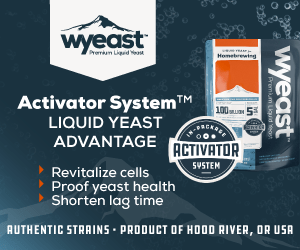Dakota Point Brewing’s Antoinette’s Antidote clone

(5 gallons/19 L, all-grain)
OG = 1.081 FG = 1.030
IBU = 33 SRM = 35 ABV = 6.7%
Ingredients
9 lbs. (4.1 kg) Maris Otter pale ale malt
12 oz. (0.34 kg) chocolate malt
12 oz. (0.34 kg) roasted barley
12 oz. (0.34 kg) flaked oats
5 oz. (142 g) crystal malt (60 °L)
8 oz. (0.23 kg) brown sugar
1.25 lbs. (0.57 kg) lactose sugar
1.25 lbs. (0.57 kg) extra light dried malt extract
1 tsp. cinnamon
1 tsp. nutmeg
1–2 Tbsp. vanilla extract
1–2 Tbsp. maple extract
9.2 AAU Magnum hops (60 min.) (0.75 oz./21 g at 12.3% alpha acids)
SafAle S-04, Wyeast 1098 (British Ale), or White Labs WLP007 (Dry English Ale) yeast
3⁄4 cup corn sugar (if priming)
Step by Step
For best results, create a spice tincture to add to the beer by taste. Combine cinnamon and nutmeg into an alcohol-based tincture, using either vodka or Bourbon. After allowing spices to soak for one to two weeks, strain using a coffee filter.
With the goal of creating a highly dextrinous wort, mash in with 3.3 gallons (12.5 L) of 168 °F (76 °C) strike water to achieve a single infusion rest temperature of 157 °F (69 °C). Hold at this temperature for 60 minutes.
With sparge water at 170 °F (77 °C), collect about 6 gallons (23 L) of wort. Add bittering hops, then boil for 60 minutes. At end of boil, carefully stir in the dried malt extract, lactose, and brown sugar.
After the boil (and optional whirlpool), rapidly chill the wort to slightly below fermentation temperature, around 66 °F (19 °C). Pitch yeast. If possible, allow fermentation temperature to rise gradually to around 70 °F (21 °C) toward the end of fermentation.
Before packaging, add a portion of the tincture in addition to vanilla extract and maple extract. Add incrementally, to taste. Bottle and prime with sugar or keg and force carbonate to 2.4 v/v.
Dakota Point Brewing’s Antoinette’s Antidote clone
(5 gallons/19 L, extract with grains)
OG = 1.081 FG = 1.030
IBU = 33 SRM = 35 ABV = 6.7%
Ingredients
6.6 lbs. (3 kg) extra light dried malt extract
12 oz. (0.34 kg) CaraFoam® malt
12 oz. (0.34 kg) chocolate malt
12 oz. (0.34 kg) roasted barley
5 oz. (142 g) crystal malt (60 °L)
8 oz. (0.23 kg) brown sugar
1.25 lbs. (0.57 kg) lactose sugar
1 tsp. cinnamon, ground
1 tsp. nutmeg, ground
1–2 Tbsp. vanilla extract
1–2 Tbsp. maple extract
9.2 AAU Magnum hops (60 min.) (0.75 oz./21 g at 12.3% alpha acids)
SafAle S-04, Wyeast 1098 (British Ale), or White Labs WLP007 (Dry English Ale) yeast
3⁄4 cup corn sugar (if priming)
Step by Step
For best results, create a spice tincture to add to the beer by taste. Combine cinnamon and nutmeg into an alcohol-based tincture, using either vodka or Bourbon. After allowing spices to soak for one to two weeks, strain using a coffee filter.
Steep the CaraFoam®, chocolate malt, roasted barley, and crystal malt in a muslin bag in 2 gallons (8 L) of water at 152 °F (67 °C) for 30 minutes. Afterwards, place the grain bag in a colander and wash with 1 gallon (4 L) of hot water. Add water to reach a total volume of 5 gallons (19 L). Carefully stir in the malt extract.
Add bittering hops, then boil for 60 minutes. At end of boil, add lactose and brown sugar.
After the boil (and optional whirlpool), rapidly chill the wort to slightly below fermentation temperature, around 66 °F (19 °C). Add cool water to fermenter to reach 5.25 gallons (20 L) then pitch yeast. If possible, allow fermentation temperature to rise gradually to around 70 °F (21 °C) toward the end of fermentation.
Before packaging, add a portion of the tincture in addition to vanilla extract and maple extract. Add incrementally, to taste. Bottle and prime with sugar or keg and force carbonate to 2.4 v/v.
Tips For Success:
Getting the spices dialed in is going to be one of the biggest challenges trying to recreate this beer. Using a 0.1-mL pipette (or eyedropper) to measure out the tincture and extract and a 1-oz. (28-mL) shot glass, will help you determine the best flavor combination. Then you’ll just need to scale up from one ounce to 5 gallons (19 L) or whatever batch size you produce.
Written by Derek Dellinger

A French toast-inspired dessert stout that will require the brewer to fine-tune in order to get a version that they are happy with.



